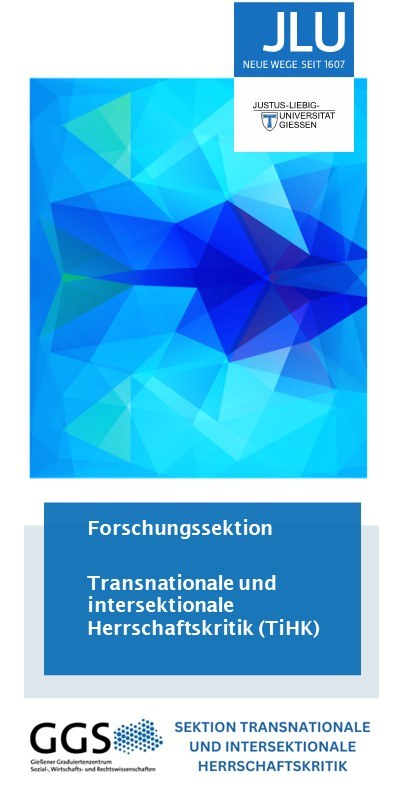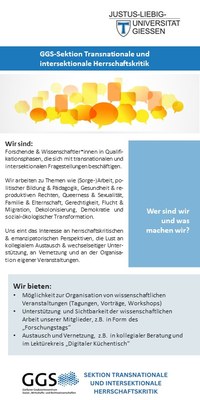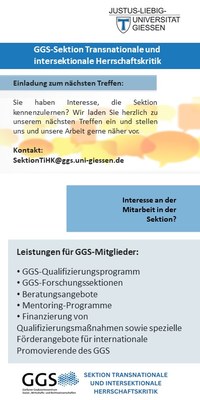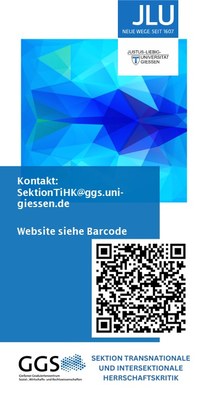Transnationale und Intersektionale Herrschaftskritik (TIHK)
Aktuelles
Forschungstag der Sektion Transnationale und intersektionale Herrschaftskritik 2024
Am 20.11.2024 findet der diesjährige Forschungstag der Sektion statt!
Wir freuen uns sehr, dass in diesem Jahr gleich drei neue Mitglieder der Sektion Projekte vorstellen und mit uns diskutieren. Außerdem wird wieder Zeit für Vernetzung und gemeinsame Planung für 2025 sein. Wer Interesse hat, dazu zu stoßen und die Sektion kennen zu lernen ist herzlich eingeladen!
Workshop Critical and Liberatory Methods for Research and Teaching


The Working Group Critical Peace Research of the Association for Peace and Conflict Studies
(AFK e.V.) and the Section Transnational and Intersectional Critique of Power at the
Giessen Graduate Center for Social, Economic and Legal Sciences (GGS) of the Justus Liebig
University Giessen invite you to the second workshop on critical and liberatory methods. In
this workshop, we want to critically examine the possibilities, conditions and limitations to
conducting research and teaching in critical and liberatory ways. The workshop will take place
online and is hosted by the Justus Liebig University Giessen, Germany.
Critical research deals with intersecting relations of power, violence and domination such as
racism, classism, sexism and capitalism and asks how these relations condition, reproduce and
legitimize social inequality and difference. Particularly against the backdrop of the
examination of epistemic violence (Spivak 1988; Brunner 2020) and the call for the
decolonization of knowledge (e.g. Castro-Gómez 2007; Gutiérrez Rodríguez 2016), there is -
again - a growing interest in a critical examination of domination in one's own scholarly
activities, including in peace and conflict studies (Cárdenas 2023). At the same time, we must
acknowledge that forms of onto-epistemic extractivism (Rivera Cusicanqui 2012, 2018;
Grosfoguel 2016), whiteness (Frye 1992) and heterosexism are not only prevalent in
hegemonic scholarship but are also often part of so-called decolonial and feminist initiatives.
Given the observation that emancipatory work in higher education institutions is involved in
the reproduction of various forms of violence (e.g. BRIDGES 2022), we find that critical and
perhaps even liberatory research is neither simple nor unambiguous.
We are also confronted with the question of what critical or liberatory methods in teaching
and scholarship can and should look like and whether it may contribute to non-reformist
reforms and abolition or if it stabilizes power asymmetries (Hwang 2022). This has become
particularly important considering the increasing visibility of debates about sexualized
violence at universities - often intertwined with racism, authority and other forms of violence
(e.g. Viaene et al. 2023). This increase has also led to a public statement by the Association of
Peace and Conflict Studies condemning sexualized violence in peace and conflict studies and
calling on academics to contribute to structural change (AFK e.V. 2023).
In this workshop, we want to critically examine the possibilities, conditions and limitations to
conducting research and teaching in critical and liberatory ways. The workshop will take place
online. In a first workshop in December 2022, we initiated a list of ingredients of critical and
liberatory research and teaching, such as positionality, ethics, humility, relationality, benefits
for participants, exchange (among researchers), agency and power, and integral research. We
believe that these should be part of what could be conceived as an adaptable methods menu.
This second workshop aims at bringing people together who want to contribute to critical and
liberatory research and teaching and deepen the exchange on topics, issues and challenges
that arise from it. The workshop, therefore, provides space for dialogue and networking, but
also for discussing whether and how working in an anti-oppressive way can be done in the
context of the university. There will be enough space for collegial consultation and exchange
on the participants' projects. We also want to deepen our exchange on the ingredients, and
expand and/or adapt the above-mentioned list. We hope to publish the list of ingredients for
a critical methods menu on the website of the Working Group Critical Peace Research of the
Association for Peace and Conflict Studies.
Planned workshop schedule, 3-4 hours each (subjected to change, depending on
participants’ availability and geographic location):
• November 13th (Day 1):
o Arrival, get-together
o Dialogical Fishbowl: "Critical research, but how? - On current debates and examples in
teaching and research" (tbd)
• November 14th (Day 2):
o Collegial exchange on projects and questions of participants
o Discussion/further work on the "ingredients" in small groups
o Public panel discussion: Possibilities and limits of critical and liberatory research and
teaching with researchers and research partners (tbd)
• November 15th (Day 3):
o Collegial exchange on projects and questions of participants Discussion/further work
on the "ingredients" in small groups
o Joint work on the "ingredients" in small groups
• November 16th (Day 4):
o Joined work on the "ingredients" in small groups
o Collegial exchange on projects and questions of participant
o Reflections and concluding discussion on further steps
The workshop is aimed at early career researchers (broadly conceived) of social sciences and
peace and conflict studies interested in engaging in a joint critical reflection of their/our work.
We look forward to hearing from you,
María Cárdenas & Philipp Lottholz.
Tagung "Geschlechterkulturen und Krieg" 14. und 15. November 2024
Weitere Infos zur Tagung siehe Tagungswebseite.

Lektürekreis "Macht - Kritik - Möglichkeitserweiterung in Wissenschaft, Beratung und Praxis"
Ausgangspunkt: Angesichts globaler Herausforderungen und multipler Krisen sind Fragen nach einer sozial-ökologischen Transformation allgegenwärtig. Gesellschaftliche und individuelle Krisen sind dabei in vielen Leben (vor allem von Frauen, LGBTIQA+ und Marginalisierten) verschränkt. In ihrer Verwobenheit berühren sie Aspekte von Macht und Machtkritik sowie Potentiale der Möglichkeitserweiterung sowohl auf der Ebene von (Change) Agency & Persönlichkeitsentwicklung, als auch auf der Ebene kritisch-reflexiver Berufspraxis von Wissenschaftler*innen und Berater*innen.
Vor diesem Hintergrund lesen & diskutieren wir Texte aus Wissenschaft und Praxis, die sich in den Wechselbezügen von (queer-)feministischer (Erkenntnis-)Theorie, kritisch-emanzipatorischer Forschung und machtkritischer Beratungs- und Therapiepraxis ansiedeln. Im Zentrum steht dabei die Frage nach Prinzipien, Formen und Methoden von Macht, Kritik und Möglichkeitserweiterung.
Der Lektürekreis ist Teil der Reihe „Towards Sustainable Research – Perspectives for a Transformative Science“ der Sektion Transnationale und intersektionale Herrschaftskritik (s. dazu den Reiter in der Spalte links).
Leitung: Dr. Tina Jung; Mitglieder: Dr. Sarah Czerney, Maris Dreyer, Rebekka Jost, Dr. Tanja Rode, Jonas Rothlaender und Christiane Winkler.
Kontakt: SektionTiHK@ggs.uni-giessen.de
Neues Leitungsteam der Sektion „Transnationale und intersektionale Herrschaftskritik“ (TiHK)
In ihrer Mitgliederversammlung am 31.1.2024 hat die Sektion „Transnationale und intersektionale Herrschaftskritik“ (TiHK) ein neues Sprecherinnenteam gewählt: Dr. Tina Jung (Politikwissenschaft) und Dr. Lena Eckert (Gender Studies). Herzlichster Dank gilt den bisherigen Leiterinnen Dr. Marie Reusch und Sheila Ragunathan für ihr Engagement. Wir freuen uns überdies, neue Mitglieder in der Sektion begrüßen zu dürfen.
Mission Statement
Die Sektion „ Transnationale und Intersektionale Herrschaftskritik“ bündelt die Forschungsinteressen von Wissenschaftler*innen in Qualifikationsphasen, die sich mit transnationalen und intersektionalen Herrschaftsverhältnissen und emanzipatorischen Perspektiven beschäftigen. Dazu gehören u.a. (Sorge-)Arbeit, Bildung & Pädagogik, Gesundheit & reproduktive Rechte, Queerness & Sexualität, Familie & Elternschaft, Gerechtigkeit, Flucht & Migration, Dekolonisierung, Demokratie und sozial-ökologische Transformation. Damit stellt die Sektion zugleich einen gemeinsamen, interdisziplinären Arbeitszusammenhang für den wissenschaftlichen Austausch über die lokalen und globalen Dynamiken von Macht und Herrschaft.
Die Haupttätigkeitsbereiche der Sektion liegen in der Organisation von wissenschaftlichen Veranstaltungen (Tagungen, Vorträge, Workshops) sowie in der Unterstützung der wissenschaftlichen Arbeit der Sektionsmitglieder, z.B. in Form des „Forschungstags“, auf dem Sektionsmitglieder ihre Forschungsprojekte vorstellen und diskutieren können. Darüber hinaus verbindet die Mitglieder der Sektion das geteilte Interesse an der Diskussion ausgewählter wissenschaftlicher Veröffentlichungen in Form eines Lektürekreises.
Interesse an der Mitarbeit in der Sektion?
Interessierte Nachwuchsforscher*innen sind herzlich zur Mitarbeit in der Sektion eingeladen! Wenn Sie Fragen haben oder gerne bei dem nächsten Treffen die Sektion kennenlernen möchten, kontaktieren Sie die Sektion: SektionTiHK@ggs.uni-giessen.de




Leitung und Mitglieder der Sektion
Dr. Lena Eckert & Dr. Tina Jung (Leitung)
Natalie Basedow
María Cárdenas
Dr. Cecilia Colloseus
Dr. Sarah Czerney
Maris Dreyer
Dania Eugenidis
Dr. Dinah Kristin Leschzyk
Tanja Manthey-Gutenberger
Michaela Müller
Sheila Ragunathan
Dr. Marie Reusch
Tarek Shukrallah
Dr. Viviane Vidot
Christiane Winkler
Dr. Veronika Zablotsky
